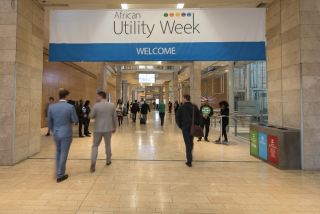Hydrogen, financing the energy transition and climate change in focus at high-level discussions at Enlit Africa next month
Can Africa carve out a role for itself in the burgeoning hydrogen market? How do cities climate proof their energy sectors and water systems? Where will the funding come from for the 5Ds of the energy transition?
These are just some of the pertinent questions and topics up for discussion during the upcoming Enlit Africa, taking place from 8 to 10 June, featuring live sessions with the sector’s leading minds. The online platform will be opened with a welcome address by South Africa’s mineral and energy resources minister, Gwede Mantashe.
Hydrogen
“Countries such as South Africa and Kenya already have the infrastructure in place which can be leveraged to take advantage of green hydrogen both for production and export,” says Hendrik Malan, partner and Africa CEO at Frost & Sullivan Africa and moderator of the upcoming session on: The role of Africa in the global hydrogen-generation market.
“Hydrogen, specifically green and blue,” he explains, “has the potential to considerably accelerate sub-Saharan Africa’s electrification rate. Furthermore, through export of this green resources, local economies can be strengthened, driving job creation, and establishing countries as key suppliers ahead of the rest of the world.”
According to Malan, while hydrogen is still in the R&D and early implementation phase, governments already need to put the respective legislation and regulations in place to enable fast implementation.
Climate change
Climate change and its effect on the future of the energy sector is a critical theme that forms a thread throughout the Enlit Africa programme. From the opening session’s panel that will focus on the 5Ds of the energy transition – namely decarbonisation, decentralisation, democratisation, digitalisation and deregulation – to how African governments are currently devising their own climate change policies.
“We all know that the global community has decided to cap global warming at 1.5 degrees. The consequences of an overshoot are too catastrophic to contemplate and so we need to invest more in adaptation strategies,” says Dr Roland Nkwain Ngam, programme manager for climate justice and socio-ecological transformation at the Rosa Luxemburg Foundation.
Ngam, who is speaking in the Climate finance - adaptation and mitigation session, adds: “Coal power is killing us and we need to force polluters to pay their fair share for adaptation activities.”
Enlit Africa will also feature an exclusive interview with City of Cape Town executive director Kadri Nassiep on how the City of Cape Town is addressing climate change.
More exciting speakers and moderators on the programme include:
- Ashish Khanna, Practice Manager: West and Central Africa, World Bank, USA
- Sabine Dall'Omo, CEO, Siemens, South Africa
- Dr Albert Butare, a former Minister of State for Infrastructure in the Republic of Rwanda and currently the CEO of Africa Energy Services Group Ltd
- Gillian-Alexandre Huart, CEO, ENGIE Energy Access, Belgium
- Dr Jarrad Wright, Principal Researcher, Council for Scientific and Industrial Research (CSIR), South Africa
- Mandy Rambharos, GM: Just Energy Transition Office, Eskom, South Africa
- Ashish Kumar, Head of Innovation, Shell Foundation, United Kingdom
- Tobi Busari, Team Lead: Embedded Generation and Renewable Energy, Ibadan Electricity Distribution Company, Nigeria
Further session highlights at Enlit Africa:
- The realities of incorporating small scale embedded generation (SSEG) into a local distribution grid
- The business case for a circular economy
- Training: Fundamentals of PV systems with energy storage
- Managing revenue losses – Nigeria’s turnaround in collections despite a challenging economic environment
- How solar PV is changing the commercial and industrial energy landscape
- Bringing renewables onto the grid: G-PST Consortium presentation
- Case study: Preparing for how mini grids meet the national grid
- How gas can enable the decarbonisation of the power sector in sub-Saharan Africa
- Interview: The first solar IPP in Burundi
All content will also be available on demand following the live broadcasts.
Same inspiration, different look
Enlit Africa, taking place from 8 to 10 June, is the new brand for the Cape-town based African Utility Week and POWERGEN Africa conference and exhibition, which for more than 20 years has been the flagship power and energy show for the continent’s energy sector. The event had two very successful, interactive digital editions last year and rebranded in November 2020.
Industry support
Eskom, the Department of Mineral Resources and Energy and the City of Cape Town have been official hosting partners of the event for many years and 2021 is no different.
Global and local top technology and services suppliers to the industry, including Siemens, IFS, SAS, G3-PLC, GE, Toshiba and Conlog are returning as sponsors at Enlit Africa. Other industry supporters are Prime Alliance, WESGRO, City of Cape Town, and Ntiyiso Consulting and many more.
ESI Africa, the continent’s leading news provider for power and energy news, is the official host publication while the Enel Foundation is back as the knowledge partner.
Enlit Africa is organised by Clarion Events Africa, a multi-award-winning Cape Town-based exhibition and conference producer across the continent in the infrastructure, energy and mining sectors. Other well-known events include Nigeria Mining Week, Africa Mining Forum and DRC Mining Week.
Enlit Africa dates and venues:
Digital Event: 8 - 10 June 2021
Next live, in-person conference and exhibition: 7 – 9 June 2022
Venue: CTICC, Cape Town, South Africa
Website: www.enlit-africa.com
Media contact:
Annemarie Roodbol
Email: This email address is being protected from spambots. You need JavaScript enabled to view it.
World Bank to show how Africa’s electricity providers can be profitable and still make electricity affordable at African Utility Week in Cape Town
“Rather than tariff increases, cost reductions are often the best first step towards financial viability”
A new World Bank study presents a sobering assessment of the financial health of electricity utilities in Sub-Saharan Africa, and suggests how utilities can be profitable while extending affordable services for the poor.
“A central but under-reported issue on the movement to reach universal access is the financial health of electricity utilities. Less than half of utilities cover operating expenditures while several countries lose in excess of US$0.25 per kWh sold. In this context, it will be difficult for utilities to maintain existing assets, let alone facilitate the expansion needed to reach universal access goals,” said Lucio Monari, Director, Energy and Extractive Global Practice at the World Bank.
Mr Monari will address the Utility CEO Forum at the upcoming African Utility Week in Cape Town from 16-18 May and present results of a recent World Bank study: “Making Power Affordable for Africa and Viable for Its Utilities”.
The study looked at utility financial statements and power tariffs in more than 40 countries, and spending data in household surveys for 22 countries. “It remains surprisingly difficult to get basic bread-and-butter data such as tariff schedules, operational performance data, and financial statements. We focused heavily on raw data collection directly from Sub-Saharan utilities. This study’s strength is that it distils lessons from dozens of countries. We hope it will help make Africa’s power sector financially sustainable and advance the goal of universal access to electricity,” Mr Monari explained.
Key messages from the report suggest several ways of recovering the cost of supply and making electricity affordable:
- One third of countries may become financially viable through improving operational efficiency.
- It is almost certain that increasing tariffs will be needed in the remaining two-thirds of the countries studied.
- Individual meters in poor households can help utilities target cross-subsidies better.
- Installing prepaid meters would benefit both utilities and customers.
- The first priority in increasing access to electricity is to make the initial connection affordable to the poor.
Increasing potential of mini and off-grid
Mr. Monari is a featured speaker at African Utility Week and the Energy Revolution Africa conference and exhibition in Cape Town from 16-18 May. He says: “To make the power sector more viable, sector governance and utility management need to be strengthened. The regulatory framework should be clear and predictable, providing incentives for the utility to improve their performance. Privatization and unbundling can work where the conditions are right. Unbundling does have transaction costs that need to be considered and weighed carefully against the benefits of creating new institutions.”
The World Bank study focused primarily on grid electricity, says Mr Monari, adding: “while connecting to the grid is a solution for urban Africans and many people living in rural areas, rural electrification cannot rely solely or even largely on grid extension. Mini and off-grid electricity, especially from sources like solar, offers increasing potential to electrify homes in many rural areas of Sub-Saharan Africa.”
Eskom performs well, but low tariffs highlighted
The study states that South Africa has the most developed and complex electricity sector in Sub-Saharan Africa and that its installed capacity alone is equivalent to the rest of the continent. Eskom also seemed to be one of the best performing utilities in the region with regards to technical and non-technical losses. However, the report identified low tariff levels as a major issue. Says Mr Monari: “as Eskom moves away from aged coal plants to modernize its generation fleet, prices will likely need to increase to cover the investment costs for capacity rehabilitation and expansion, or else the utility will continue to pose a fiscal burden to the government.”
To read the full the interview with Lucio Monari and the World Bank study, go to: http://www.african-utility-week.com/WorldBank-AUWinterview
Real world doers share their expertise
The 17th annual African Utility Week is the leading conference and trade exhibition for African power, energy and water professionals who will have the opportunity to meet over 300 suppliers of services and technology to the industry.
Energy Revolution Africa will provide a unique forum for solution providers to meet with the new energy purchasers such as metros and municipalities, IPPs, rural electrification project developers and large power users, including mines, commercial property developers and industrial manufacturers. The latest innovations and projects in the sectors of renewables, future technology, energy efficiency, micro/off-grid and energy storage will be showcased.
Industry support
Apart from KPMG’s diamond sponsorship, industry stalwarts EPG, GE, Huawei, Landis+Gyr, Lucy Electric, Ontec and Shell are platinum sponsors while Aberdare Cables, Conlog, Oracle Utilities, SAP, SBS Tanks and Vodacom have already confirmed their gold sponsorships.
African Utility Week and Energy Revolution Africa is the flagship energy event organised by the multi-award winning Spintelligent, leading Cape Town-based trade exhibition and conference organiser, and part of Clarion Events Ltd, based in the UK. Other well-known energy events by Spintelligent are Future Energy Nigeria (formerly known as WAPIC), Future Energy East Africa (formerly EAPIC), Future Energy Uganda and Future Energy Central Africa.
Other industry-leading events organised by Spintelligent are DRC Mining Week, Kenya Mining Week, Nigeria Mining Week, Agritech Expo Zambia, Property Buyer Show, African Real Estate & Infrastructure Summit and Eduweek.
Earlier this year, Spintelligent won four major awards at the ROAR Organiser and Exhibitor Awards, which honour excellence in the exhibition and events industry on the continent and were organised by the Association of African Exhibition Organisers (AAXO). African Utility Week won for Best Trade Exhibition 6001-12000 sqm category, (joint winners with the World Travel Market).
Dates for African Utility Week and Energy Revolution Africa:
Conference and expo: 16-18 May 2017
Awards gala dinner: 17 May 2016
Site visits: 19 May 2016
Location: CTICC, Cape Town, South Africa
Interviews with expert speakers: http://www.african-utility-week.com/expertinterviews
Website: http://www.african-utility-week.com
Twitter: https://twitter.com/AfricaUtilities #AUW2017
Linkedin: African Power Forum
Media contact:
Senior communications manager: Annemarie Roodbol
Telephone: +27 21 700 3558
Mobile: +27 82 562 7844
Email: This email address is being protected from spambots. You need JavaScript enabled to view it.



